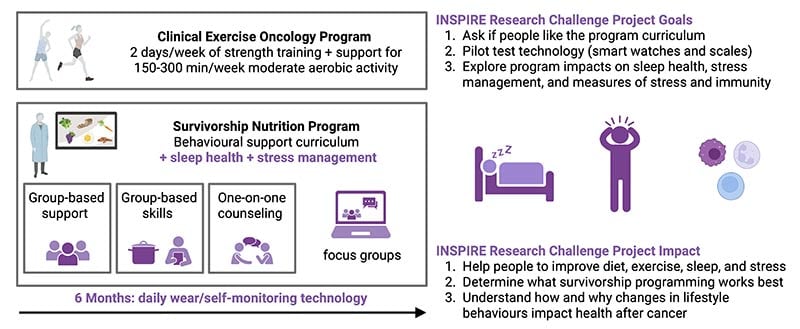Grant title: Impact of an integrated nutrition and exercise program for post-treatment survivors on sleep quality, perceived stress, and biomarkers of immune dysregulation
Institution: Regents of the University of Colorado
Grant awarded: September 2025
Offering behavioural support that can help individuals increase adherence to evidence-based lifestyle recommendations has the potential to improve health after a cancer diagnosis. However, knowing what parts of comprehensive programmes are most useful and understanding how changes in behaviour impact health remains a challenge. This project will provide important insight into what programme components may work best, and how and why changes in lifestyle behaviours influence biological responses related to stress and immunity to improve health.
I am incredibly grateful to World Cancer Research Fund International and the American Institute for Cancer Research for the generous support of early career researchers like myself, as we continue to study the role of lifestyle behaviours in improving the trajectory of survivorship and am thrilled to have the opportunity to continue my work in designing meaningful programming for those living with and beyond cancer – Dr Emily Hill
Background
Eating a balanced diet, getting enough physical activity, sleeping well and managing stress can help improve quality of life and health among people who have had cancer. However, this group often needs special support after a cancer diagnosis. While many programmes that have been tested show promise, most never make it to the real world.
To improve this, we need to think about how we are building the best programme from the start. In addition to education, people may need a chance to talk with others in the same situation, hands-on practice to learn a skill, or one-on-one support. Adding technology such as smart watches or bathroom scales into these programmes could provide support and help people track their behaviours better. We can also use these devices to measure activity and weight over time, to help us know if a programme is working. Importantly, while we know that healthy behaviours can impact a person’s biology by reducing markers of stress or improving immune function, these things are not often measured in these programmes.
Aims and objectives
We are developing a programme for cancer survivors to address nutrition, exercise and other behaviours. The goal of this study is to see if including education on sleep health and stress management, and adding technology such as smart watches, are liked and if they can help people. We also want to know how being in the programme impacts measures of stress and immunity, to better understand how lifestyle behaviours influence health in survivorship.
How it will be done
We are running a clinical trial with 64 people who have had cancer that are living with overweight or obesity. They will enrol in one of 8 versions of a nutrition programme to see which parts work best. They will also enrol in an existing clinical exercise programme, to see if it is possible to do both programmes at the same time.
In this project, we will be testing new parts of the programme, including education on sleep and stress, to see if people like them. To do this, we will use surveys and ask people for their opinions during focus groups. We will also run another study with 16 people, where we can test the best version of the nutrition programme with added smart watches and bathroom scales, to see if people like these devices and find them helpful. We will also measure if the combined nutrition and exercise programme impacts diet, physical activity, body weight, sleep health and stress management through surveys, to ask people about their habits, and through measuring stress and immune markers in blood.

Created by Dr Emily Hill, Regents of the University of Colorado
Potential impact
This study will help people who have had cancer to improve their diet, exercise, sleep and stress levels. The goal is to create a comprehensive lifestyle programme and to better understand how and why changes in behaviours improve health after a cancer diagnosis. Greater availability of such programmes during survivorship will provide much needed support during a person’s cancer journey.
